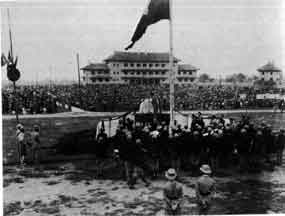1946 Vietnamese Resist France
In September 1945, Ho Chi Minh, leader of the Nationalist opposition to the Japanese, declared Vietnam independent. France was not willing to grant full independence. Attempts were made to reach an agreement with Ho Chi Minh for Vietnam to be a Free State within the French Union. When talks broke down, the French Navy bombarded Haiphong killing six thousand people. The French did reach an agreement with Boa Dai, the former emperor of Annan, who agreed to the French plan of an independent state within the French Union. The result was a war that lasted for 30 years.
In September 1945, at the end of World War II, Ho Chi Minh - the leader of the Viet Minh (a national independence coalition) - declared Vietnam's independence from France. This followed Japan's surrender in World War II, as Japan had occupied Vietnam during the war after the fall of France to Nazi Germany.
However, France, emerging from the devastation of World War II, was not willing to give up its colonies so easily. They hoped to negotiate a middle ground where Vietnam would remain in the French Union, a political entity created to manage France's colonies and overseas territories, as a "Free State".
Negotiations with Ho Chi Minh did not succeed, and tensions escalated into violence. In November 1946, the French Navy bombarded the northern Vietnamese city of Haiphong, reportedly killing thousands, an event often considered the starting point of the First Indochina War.
Meanwhile, the French did manage to strike a deal with Bao Dai, the last emperor of the Nguyen Dynasty, in 1949. Bao Dai was made the "Chief of State" of the State of Vietnam, a new entity within the French Union. However, this did little to quell the aspirations of full independence among many Vietnamese, particularly the Viet Minh.
The resulting conflict, the First Indochina War, lasted from 1946 to 1954, ending with the Geneva Accords that divided Vietnam into North and South at the 17th parallel. The Viet Minh controlled the North (with Ho Chi Minh as President), and Bao Dai's State of Vietnam controlled the South. Bao Dai was later deposed in a referendum orchestrated by his Prime Minister, Ngo Dinh Diem, in 1955.
 >
>